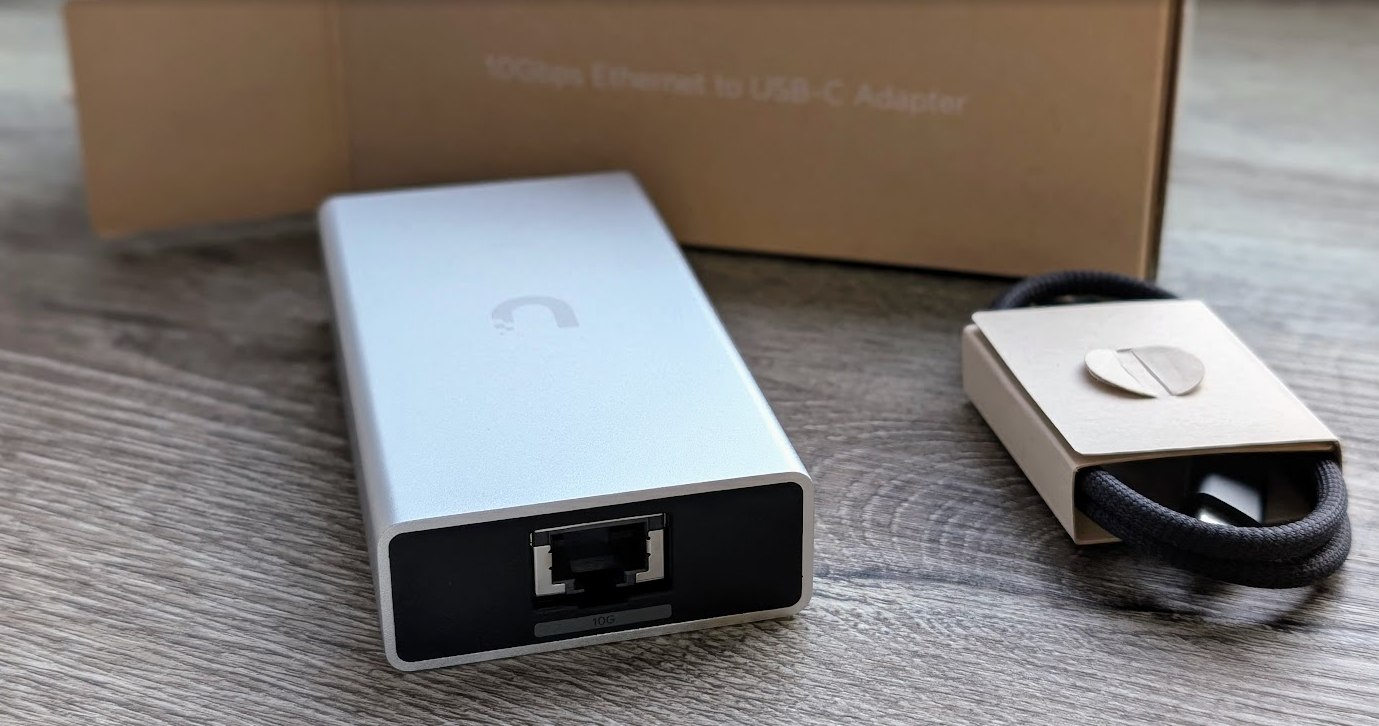Got one Ubiquiti Unifi 10G Ethernet Adapter, model UACC-Adapter-RJ45-USBC-10GE. In the past, I’ve mostly got StarTech adapters for 10G Copper, but right now they’re either sold out or going for double the price. The Unifi 10G is 150€ plus tax, it fits what I need.

First off, it plugged right in on my Linux laptop running kernel 6.14 and a MacBook Air. No fuss with drivers or anything. Here’s what the kernel spit out on Linux:
thunderbolt 0-1: new device found, vendor=0xa5 device=0x27
thunderbolt 0-1: Ubiquiti Inc. UACC-Adapter-RJ45-USBC-10GE
thunderbolt 0-0:1.1: new retimer found, vendor=0x8087 device=0xd9c
pcieport 0000:00:07.0: pciehp: Slot(12): Card present
pcieport 0000:00:07.0: pciehp: Slot(12): Link Up
atlantic 0000:03:00.0 eth0: atlantic: link change old 0 new 10000
TCP: eth0: Driver has suspect GRO implementation, TCP performance may be compromised.
Speeds
It showed up as expected, and speeds looked good from the start. One thing to Note: this adapter only works on Thunderbolt 3 or 4. Forget about regular USB-C it won’t work.
Some blogs go negative about Adapters PCIe lane requirements, like how your host needs enough lanes to hit full speed. But in my case, that wasn’t a problem.
I pulled 9.37 Gbit with iperf3, and OpenSpeedTest clocked around 9.6 Gbit. That’s basically as good as it gets for 10G, considering overhead. I tested it hooked to a Unifi XG 10Gbit switch over a 10m CAT 7 cable with a default MTU of 1500.
### iperf3 -P 4
[ ID] Interval Transfer Bitrate Retr
[ 5] 0.00-10.00 sec 2.47 GBytes 2.12 Gbits/sec 764 sender
[ 5] 0.00-10.00 sec 2.47 GBytes 2.12 Gbits/sec receiver
[ 7] 0.00-10.00 sec 3.03 GBytes 2.60 Gbits/sec 657 sender
[ 7] 0.00-10.00 sec 3.03 GBytes 2.60 Gbits/sec receiver
[ 9] 0.00-10.00 sec 3.02 GBytes 2.59 Gbits/sec 752 sender
[ 9] 0.00-10.00 sec 3.02 GBytes 2.59 Gbits/sec receiver
[ 11] 0.00-10.00 sec 2.39 GBytes 2.05 Gbits/sec 712 sender
[ 11] 0.00-10.00 sec 2.38 GBytes 2.05 Gbits/sec receiver
[SUM] 0.00-10.00 sec 10.9 GBytes 9.37 Gbits/sec 2885 sender
[SUM] 0.00-10.00 sec 10.9 GBytes 9.36 Gbits/sec receiver
### iperf3 -P 4 -R
[ ID] Interval Transfer Bitrate Retr
[ 5] 0.00-10.00 sec 2.74 GBytes 2.35 Gbits/sec 3820 sender
[ 5] 0.00-10.00 sec 2.73 GBytes 2.35 Gbits/sec receiver
[ 7] 0.00-10.00 sec 2.43 GBytes 2.09 Gbits/sec 3908 sender
[ 7] 0.00-10.00 sec 2.42 GBytes 2.08 Gbits/sec receiver
[ 9] 0.00-10.00 sec 2.76 GBytes 2.37 Gbits/sec 2279 sender
[ 9] 0.00-10.00 sec 2.76 GBytes 2.37 Gbits/sec receiver
[ 11] 0.00-10.00 sec 2.99 GBytes 2.57 Gbits/sec 4103 sender
[ 11] 0.00-10.00 sec 2.99 GBytes 2.57 Gbits/sec receiver
[SUM] 0.00-10.00 sec 10.9 GBytes 9.38 Gbits/sec 14110 sender
[SUM] 0.00-10.00 sec 10.9 GBytes 9.37 Gbits/sec receiver
Features
It’s built on an AQC113 chip from Marvell, which handles the 10GBASE-T side. The chip is capable of doing Multigig NBASE-T at 10G/5G/2.5G/1G/100M/10M.
Feature wise some to note:
- 8 QoS Classes
- WoL
- LSO, RSS, DCA
- PTPv2
- Multigen PCI Express: 4>3>2
Build
It is build all metal, fanless, so it stays quiet. I’ve read other reviews where it hits 44-45°C under load, around 40°C idle, which matches what I noticed, gets warm but nothing crazy. It’s smaller than the StarTech TB 10G adapters I own a few of, so that’s a win for portability. But tbh. I normally not taking those on travel anyway.
All in all, a solid buy. If you’re eyeing a portable 10G upgrade and have the right ports, it’s worth considering.
Comments
With an account on the Fediverse or Mastodon, you can respond to this post. Since Mastodon is decentralized, you can use your existing account hosted by another Mastodon server or compatible platform if you don't have an account on this one. Known non-private replies are displayed below.